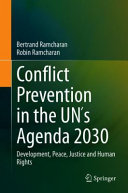
Conflict Prevention in the UN ́s Agenda 2030
By - Ramcharan, B. G
Floor
-
Floor 1
Published
-
Springer, Cham, 2020
ISBN 10 - 3030365093
ISBN 13 - 9783030365097
Book Status
-
1 Qnty Available with us.
Subject
-
Conflict management
Shelf No
-
18
Call Number
-
341 RAM
Physical Description
-
XXV,149 Pages
Notes
-
Includes Index